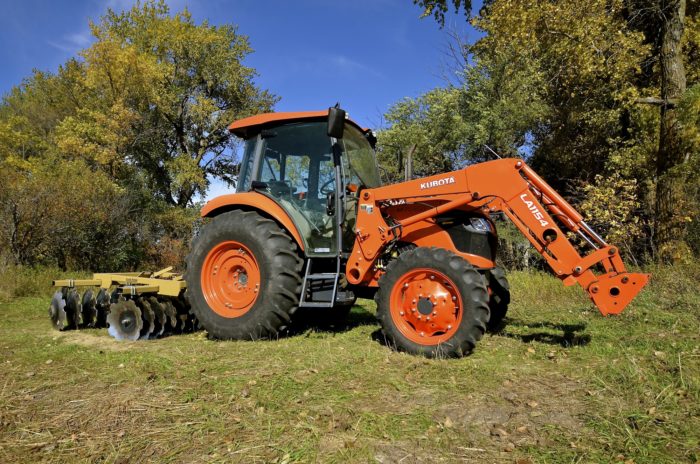Top Class Actions’s website and social media posts use affiliate links. If you make a purchase using such links, we may receive a commission, but it will not result in any additional charges to you. Please review our Affiliate Link Disclosure for more information.

The plaintiff is Burgess Properties LLC, an Alabama corporation that uses Kubota tractors. Allegedly, Burgess purchased a 2017 Kubota L5460HSTC Tractor on Sept. 28, 2017 to use for work purposes.
Burgess reportedly stored the tractor in a covered barn, as many tractor owners do. The company claims that the tractor failed in January 2018, and after taking it in for a repair assessment it was discovered that the wiring harnesses had been destroyed by rodent chewing.
An authorized Kubota dealer allegedly told Burgess that the wiring had been destroyed because it was made from a soy-based product that attracted rodents. Allegedly, Burgess was informed that the repair would cost $1,753.10, and that the rodent-related damage would not be covered by Kubota’s warranty.
The Kubota tractor class action lawsuit claims that soy and bio-based wiring is known to attract rodents more than wiring covered by glass, plastic, or polymer-based insulations. Soy-based insulation is reportedly cheaper than the alternatives, but attracts rodents because rodents eat soy and bio-based products.
Reportedly, many companies began using soy and bio-based wiring after gas prices rose in the mid to late 2000s, when fewer people bought vehicles, and vehicle manufacturers saw a downturn in profits. Thus, many companies made efforts to decrease their manufacturing costs, including the cost of wiring.
Burgess claims that the Kubota dealer told them that Kubota had started using the soy-based wiring because the company was experiencing financial problems.
In 2012, the United States Department of Agriculture reported on the use of soy-based wiring, noting that many companies did tout the fact that soy or bio-based wiring is more environmentally friendly than synthetic wiring, but that most companies used it for its cost effectiveness.
The Kubota tractor wiring class action states that Kubota knowingly caused customers financial injury by using a material that put wiring at risk to rodent damage, and by refusing to cover the damage in a warranty.
Burgess claims that had they known that the wiring could be easily damaged by rodents, they would not have purchased the vehicle, or would not have paid as much for it as they did.
Additionally, the Kubota wiring class action lawsuit claims that Kubota knowingly endangered the safety of the tractor drivers and others. They allege that rodent damage to wiring can cause a vehicle’s systems to fail in ways that can cause the vehicle to malfunction, get into a collision, and otherwise be dangerous.
Burgess states that soy and bio-based wiring is not suitable for its intended purchase, and that Kubota knew this but used it nonetheless in the interest of increasing its profits and decreasing its costs, while causing injury to customers, drivers, lessees, and others.
Burgess Properties LLC is represented by Joseph “Jay” H. Aughtman of Aughtman Law Firm LLC, Richard M. Golomb and Kenneth J. Greenfield of Golomb & Honik PC, and Richard D. Morrison of The Morrison Law Firm LLC.
The Kubota Tractor Soy-Based Wiring Class Action Lawsuit is Burgess Properties LLC v. Kubota Tractor Corporation, et al., Case No. 5:18-cv-00897, in the U.S. District Court for the Northern District of Alabama, Northeastern Division.
ATTORNEY ADVERTISING
Top Class Actions is a Proud Member of the American Bar Association
LEGAL INFORMATION IS NOT LEGAL ADVICE
Top Class Actions Legal Statement
©2008 – 2024 Top Class Actions® LLC
Various Trademarks held by their respective owners
This website is not intended for viewing or usage by European Union citizens.















8 thoughts onKubota Tractor Class Action Lawsuit Claims Wiring Attracts Rodents
Mine has caught a fire twice and been Replaced but still shorting out
2013 m110gx replacing wiring harness because of mice eating wiring
Recently purchased a Kubota B2650hsd at a Ironplanet Auction. Tractor had an engine fire that owner blamed rodent caused. Fired destroyed everything plastic and melted wiring on engine. Could restore wiring if Kubota would sell the connections, however, they will only sell complete wiring harness for $1390.
I just paid $500.00 for rewiring my Kubota b7800 the shop said the damage was from mice eating my wires 03/18/2019
Mine has caught a fire twice and been Replaced but still shorting out
Get a dang cat, mice have been chewing wires since long before soy and bio-based wiring were available…
It is important to note that dogs or sheep that WILL chew are also attracted to this, as my son’s new tractor just got the hell chewed out of his wiring. Wondering about the materials the seats are made of as well, as that was also destroyed. Very expensive for a $20k plus tractor!!!
I purchased a new M5660 Kubota tractor in Dec. 2017. I have had numerous rodent nests behind the dash board wiring. Every time I use the tractor I have to clean the nest out. I’ve had trouble with blown fuses. I’ve also had trouble with the PTO switching on and off. I believe my problems are related to this case.
Thank you